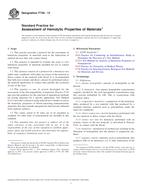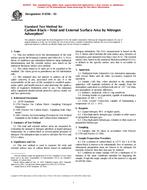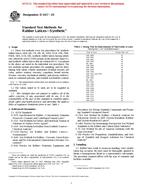1.1 This guide covers criteria which should be considered when selecting sampling equipment for collecting environmental and waste samples for waste management activities. This guide includes a list of equipment that is used and is readily available. Many specialized sampling devices are not specifically included in this guide. However, the factors that should be weighed when choosing any piece of equipment are covered and remain the same for the selection of any piece of equipment. Sampling equipment described in this guide includes automatic samplers, pumps, bailers, tubes, scoops, spoons, shovels, dredges, coring and augering devices. The selection of sampling locations is outside the scope of this guide.
1.1.1 Table 1 lists selected equipment and its applicability to sampling matrices, including water (surface and ground), sediments, soils, liquids, multi-layered liquids, mixed solid-liquid phases, and consolidated and unconsolidated solids. The guide does not address specifically the collection of samples of any suspended materials from flowing rivers or streams. Refer to Guide D 4411 for more information.
1.2 Table 2 presents the same list of equipment and its applicability for use based on compatibility of sample and equipment; volume of the sample required; physical requirements such as power, size, and weight; ease of operation and decontamination; and whether it is reusable or disposable.
1.3 Table 3 provides the basis for selection of suitable equipment by the use of an Index.
1.4 Lists of advantages and disadvantages of selected sampling devices and line drawings and narratives describing the operation of sampling devices are also provided.
1.5 The values stated in both inch-pound and SI units are to be regarded separately as the standard units. The values given in parentheses are for information only.
1.6 This guide offers an organized collection of information or a series of options and does not recommend a specific course of action. This document cannot replace education or experience and should be used in con junction with professional judgement. Not all aspects of this guide may be applicable in all circumstances. This ASTM standard is not intended to represent or replace the standard of care by which the adequacy of a given professional service must be judged, nor should this document be applied without consideration of a project’s many unique aspects. The word “Standard“ in the title of this document means only that the document has been approved through the ASTM consensus process.
1.7 This standard does not purport to address all of the safety concerns, if any, associated with its use. It is the responsibility of the user of this standard to establish appropriate safety and health practices and determine the applicability of regulatory limitations prior to use.
Product Details
- Published:
- 01/01/2008
- Number of Pages:
- 38
- File Size:
- 1 file , 820 KB
- Redline File Size:
- 2 files , 1.6 MB


